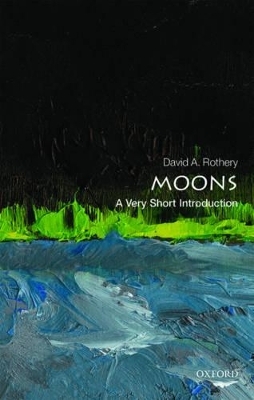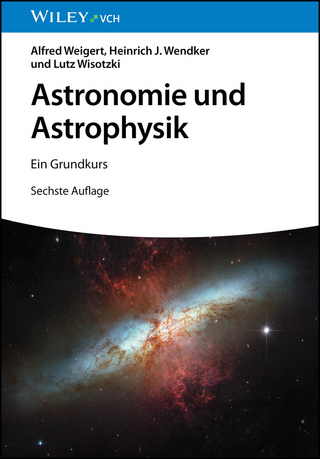
Moons
A Very Short Introduction
Seiten
2015
Oxford University Press (Verlag)
978-0-19-873527-4 (ISBN)
Oxford University Press (Verlag)
978-0-19-873527-4 (ISBN)
Our Solar System contains more moons than planets. They show astonishing variety, and some look more likely than Mars to host microbial life. David Rothery describes these fascinating small worlds, their discovery, names, and what they can tell us about our Solar System.
Proving to be both varied and fascinating, moons are far more common than planets in our Solar System. Our own Moon has had a profound influence on Earth, not only through tidal effects, but even on the behaviour of some marine animals. Many remarkable things have been discovered about the moons of the giant outer planets from Voyager, Galileo, Cassini, and other spacecraft. Scientists have glimpsed volcanic activity on Io, found oceans of water on Titan, and captured photos of icy geysers bursting from Enceladus. It looks likely that microbial life beyond the Earth may be discovered on a moon rather than a planet.
In this Very Short Introduction David Rothery introduces the reader to the moons of our Solar System, beginning with the early discoveries of Galileo and others, describing their variety of mostly mythological names, and the early use of Jupiter's moons to establish position at sea and to estimate the speed of light. Rothery discusses the structure, formation, and influence of our Moon, and those of the other planets, and ends with the recent discovery of moons orbiting asteroids, whilst looking forward to the possibility of finding moons of exoplanets in planetary systems far beyond our own.
ABOUT THE SERIES: The Very Short Introductions series from Oxford University Press contains hundreds of titles in almost every subject area. These pocket-sized books are the perfect way to get ahead in a new subject quickly. Our expert authors combine facts, analysis, perspective, new ideas, and enthusiasm to make interesting and challenging topics highly readable.
Proving to be both varied and fascinating, moons are far more common than planets in our Solar System. Our own Moon has had a profound influence on Earth, not only through tidal effects, but even on the behaviour of some marine animals. Many remarkable things have been discovered about the moons of the giant outer planets from Voyager, Galileo, Cassini, and other spacecraft. Scientists have glimpsed volcanic activity on Io, found oceans of water on Titan, and captured photos of icy geysers bursting from Enceladus. It looks likely that microbial life beyond the Earth may be discovered on a moon rather than a planet.
In this Very Short Introduction David Rothery introduces the reader to the moons of our Solar System, beginning with the early discoveries of Galileo and others, describing their variety of mostly mythological names, and the early use of Jupiter's moons to establish position at sea and to estimate the speed of light. Rothery discusses the structure, formation, and influence of our Moon, and those of the other planets, and ends with the recent discovery of moons orbiting asteroids, whilst looking forward to the possibility of finding moons of exoplanets in planetary systems far beyond our own.
ABOUT THE SERIES: The Very Short Introductions series from Oxford University Press contains hundreds of titles in almost every subject area. These pocket-sized books are the perfect way to get ahead in a new subject quickly. Our expert authors combine facts, analysis, perspective, new ideas, and enthusiasm to make interesting and challenging topics highly readable.
David Rothery is Professor of Planetary Geosciences at the Open University. He is a member of the BepiColombo science team (the European Space Agencyâs mission to Mercury), and chairs the Open Universityâs level 2 module on planetary science. He is also the lead academic for the Open University/FutureLearn Moons MOOC (massive open online course), and is the author of several books, including Planets: A Very Short Introduction.
1. The discovery and significance of moons ; 2. The Moon ; 3. The Moon's influence on us ; 4. The moons of giant planets ; 5. Giant planet regular satellites in close up ; 6. The moons of Mars - captured asteroids ; 7. Moons of small bodies ; 8. Moons in other planetary systems: exomoons ; Further Reading ; Index
| Reihe/Serie | Very Short Introductions |
|---|---|
| Zusatzinfo | 26 black and white halftones |
| Verlagsort | Oxford |
| Sprache | englisch |
| Maße | 116 x 174 mm |
| Gewicht | 151 g |
| Themenwelt | Sachbuch/Ratgeber ► Natur / Technik ► Weltraum / Astronomie |
| Naturwissenschaften ► Physik / Astronomie ► Astronomie / Astrophysik | |
| ISBN-10 | 0-19-873527-8 / 0198735278 |
| ISBN-13 | 978-0-19-873527-4 / 9780198735274 |
| Zustand | Neuware |
| Haben Sie eine Frage zum Produkt? |
Mehr entdecken
aus dem Bereich
aus dem Bereich
die Suche nach der Urkraft des Universums
Buch | Hardcover (2023)
Klett-Cotta (Verlag)
CHF 34,95
Perspektiven auf die Menschheit
Buch | Hardcover (2024)
Klett-Cotta (Verlag)
CHF 34,95


